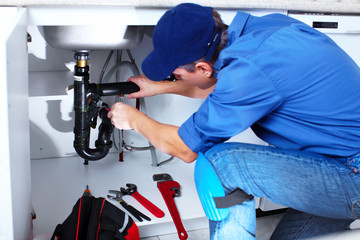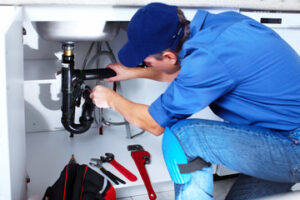A plumbing system is responsible for bringing clean water into your home, while also getting rid of waste and drainage. Plumbers are instrumental in reducing diseases such as cholera.
They are often rewarded for their hard work with excellent pay. However, like any skilled trade, becoming a plumber takes training. Contact Plumbing Shreveport now!

Pipes are the conduits that allow fluids like water or oil to flow through a plumbing system. They’re an essential part of any plumbing work and can be made out of a variety of materials depending on the application. They’re also designed to hold a specific amount of pressure and temperature and can be categorized by their nominal size (NPS), wall thickness, material, and more.
The most common pipes used for residential plumbing are PVC, PEX, copper, galvanized steel, and cast iron. Each type has its own unique advantages and disadvantages, but they all serve the same purpose: to transport water or waste throughout a building.
In terms of home plumbing, PVC is one of the most popular choices among homeowners and plumbers because it’s durable, inexpensive, and easy to install. It’s also self-insulating and can handle high temperatures for both hot and cold water. PVC is also environmentally friendly and doesn’t create any emissions during manufacturing.
Another option is copper plumbing pipe, which can last upwards of 50 years and is often found in older homes. It’s also corrosion-resistant and is the best choice for protecting the quality of your home’s water.
Finally, you can use carbon steel pipe for a variety of industrial applications, including petrochemical, chemical, and power plants. This kind of piping is extremely durable and can be categorized by its thickness, diameter, grade, and more. Carbon steel pipes are also available in a number of different styles, such as seamless and ERW, and can be further subdivided by their threading (NPT, BSP, garden hose, etc).
Fittings
Fittings connect pipe segments, change direction, reduce or expand pipe size and perform other important functions in a drain-waste-vent system. They come in a variety of shapes, sizes and materials, including copper, steel, black iron, polyvinyl chloride (PVC) and brass. They’re usually matched with the material of the pipes to which they’re connected; other factors, such as temperature conditions, pressure ratings and cost, also influence their selection.
Because a plumbing system typically operates at low pressure and relies on gravity to move liquids and entrained solids, fittings have smooth interior surfaces that prevent sharp interior ridges from catching debris or collecting material that might cause a blockage or clog. Fittings are often deburred, too, to remove projecting slivers of material that could snag or pierce other components.
Leaks are a common source of water damage, and fittings help to prevent them by sealing joints and connections. However, even with properly installed and sealed joints, leaks can occur due to corrosion, temperature changes, or other reasons. In such cases, a licensed plumber can use plumbing fittings to repair or replace damaged or worn-out pipe or tubing sections.
Piping fittings have threaded ends that screw together to join or extend pipes. The threads are designed to seal with a tight fit without using any glue or caulking. Fittings also are available with a gasket to provide an additional level of seal protection in a self-restrained joint.
There are many different types of plumbing fittings, but the most common include elbows, tees, crosses and reducers. An elbow fitting makes a 90-degree bend in the pipe, while a tee fits into a straight pipe segment and allows the pipe to continue in the same direction. A cross fitting joins two or more pipes in a perpendicular crossing, such as joining a vertical drain line to a horizontal one. A sanitary tee, which has a sweep on its perpendicular port, is used to promote water flow in a particular direction.
Fixtures
A plumbing fixture is a device that delivers water or removes waste. These essential items are vital to maintaining hygiene and sanitation in modern buildings, and they come in a wide range of shapes and sizes to meet different needs and preferences. The most common types of fixtures include sinks, faucets, toilets, and bathtubs.
Sinks are often made of porcelain, but they can also be crafted from copper, glass, ceramic, or stainless steel. In addition to providing basic functionality, they can also add a design element that complements other fixtures and decor in a room. Faucets are another common plumbing fixture, and they come in a variety of styles to suit any style. They can be mounted on the wall, or they can be freestanding in a space of their own. They can also be used to add decorative elements to a bathroom or kitchen design.
Showers and bathtubs are also popular plumbing fixtures. These devices offer an opportunity to upgrade a bathroom with luxurious features such as built-in jets for a massaging effect and therapeutic lights that change colors with the movement of water. They can also help improve the overall look of a room, coordinating well with other design elements such as tile or cabinetry.
The US plumbing fixture market is forecast to grow rapidly going forward. This is due to the aging of the population, which will lead consumers to install more products that make it easier for people with limited mobility to use their bathrooms and kitchens. These products include walk-in bathtubs, step-free shower stalls and surrounds, and touchless faucets. This trend will also lead to more demand for accessories such as handrails, seats, and grab bars.
Installation
Plumbing is the network of pipes, fixtures, and fittings that transports water and sewage in residential and commercial buildings. It is important for human life as it allows us to access clean drinking water and remove waste in a safe manner. Plumbers are responsible for installing, repairing, and maintaining these systems. They use specialized tools and equipment to work in tight spaces and deal with various materials. They also ensure that the plumbing system meets all the safety and quality standards.
The pipes in a plumbing system carry clean and dirty water separately to different destinations. They are usually made of copper, PVC, or galvanized steel. The plumbing system is connected to a water supply, which can be either public or private. The piping system connects to plumbing fixtures, such as sinks, toilets, and baths, which in turn deliver hot and cold water for washing and other purposes. The system also includes drainage pipes, which take away the wastewater.
Plumbers install, repair, and maintain these systems in homes and businesses. They ensure that the piping system is properly laid out and meets all the required safety and quality standards. They also handle a wide range of other tasks, such as rerouting drains, fixing leaks, and inspecting the plumbing system to identify any issues.
While many people think of plumbing as a mundane task, it is actually an essential service for human civilization. A well-functioning plumbing system ensures clean drinking water and effective waste disposal, which in turn contributes to a healthier lifestyle. Moreover, it prevents waterborne diseases and promotes environmental sustainability. So the next time you encounter a plumbing issue, remember that it’s not just any ordinary problem – it’s an urgent one that requires professional help.
Maintenance
Plumbing is a complex network of pipes, fixtures, and appliances that conveys fluids like water and waste throughout a building or structure. Its function is to supply clean water and remove waste, and it is essential for human life. Without a properly functioning plumbing system, buildings can face a range of issues from water damage to health hazards and environmental pollution. Performing regular maintenance to identify and address potential problems helps ensure that plumbing systems remain in good condition.
Pipes are the heart of a plumbing system, carrying water to and from fixtures. They can be made from a variety of materials, including copper, PVC, or PEX, but they must be well-maintained to prevent leaks and bursts. Valves, such as shut-off and pressure-reducing valves, regulate water flow to different areas of a building. They are also responsible for ensuring that water flows at a constant rate, helping to avoid overflow and drainage problems.
Water heaters are another key component of a plumbing system. They are used to provide hot water for cooking, washing, and cleaning. They are prone to wear and tear from frequent use, but they can last longer with routine maintenance. Plumbers can inspect and repair water heaters to ensure that they are functioning safely and efficiently.
Regular plumbing maintenance can help reduce energy costs by identifying and repairing inefficiencies. It can also extend the lifespan of fixtures like water heaters, drains, and faucets by addressing issues that may cause premature wear or tear. This can save businesses and households money on costly repairs and replacements. In addition, it can minimize downtime and improve productivity by detecting and resolving problems as they occur.


 When using drain cleaning services regularly, you can avoid the clogs resulting in backed-up water and costly repair bills. A trained plumber uses various tools to locate the problem’s source and determine the best way to clear the blockage. One of the most useful is a high-powered sewer snake that cuts through tough blockages and allows water to flow freely.
When using drain cleaning services regularly, you can avoid the clogs resulting in backed-up water and costly repair bills. A trained plumber uses various tools to locate the problem’s source and determine the best way to clear the blockage. One of the most useful is a high-powered sewer snake that cuts through tough blockages and allows water to flow freely.